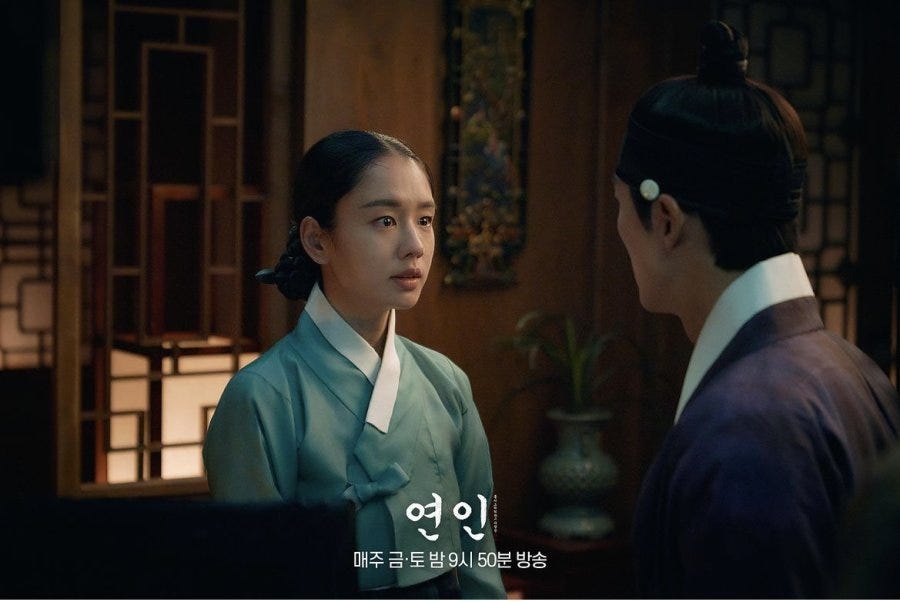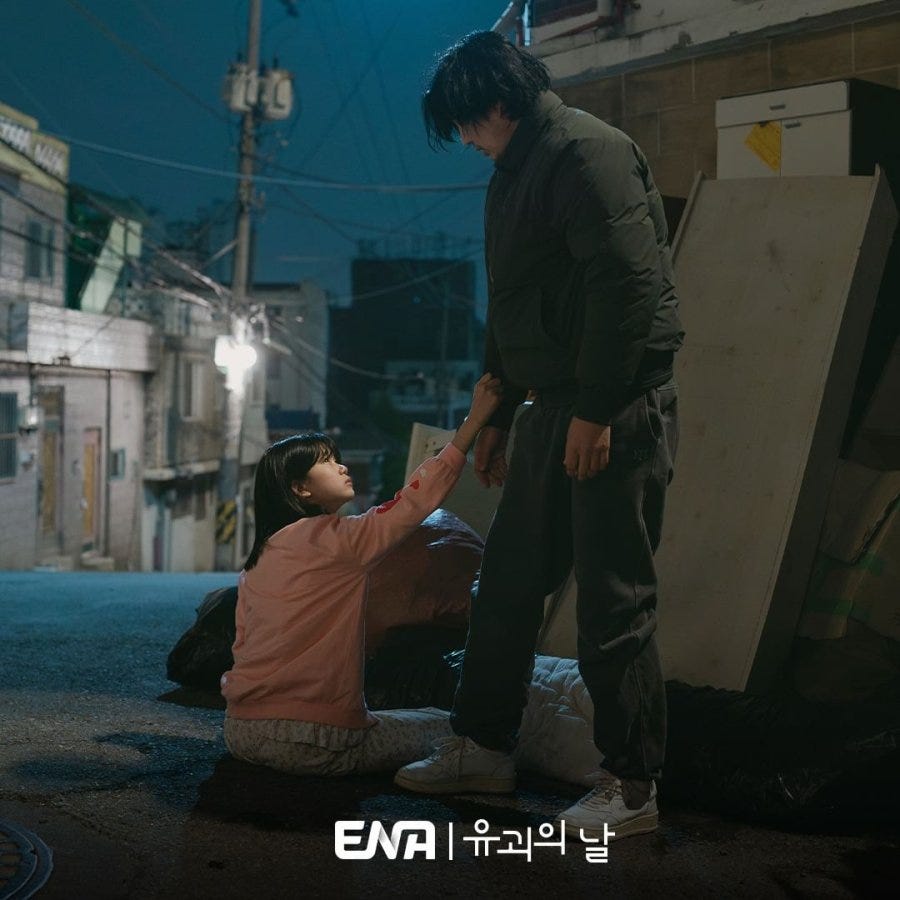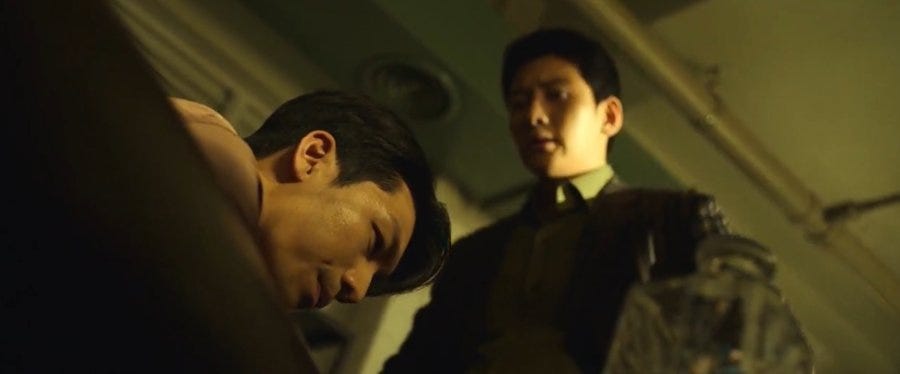My Week in Dramas 30 October 2023: My Dearest Episodes 15-16; The Kidnapping Day (2023); The Worst of Evil (2023)
It’s always something of a shame when K dramas revert/resort to tried and true tropes prolong/protract conflict for its own sake. It’s a little disappointing that even a quality production like My Dearest that does amazing things with character and story eventually fall prey to this. At this point I have an issue with Manchu Princess Gak Hwa who is walking talking trope. Lee Chung-ah is great of course. It’s just that I’m having a hard time believing that she’s in love with Jang-hyeon or even that a clever hard headed woman like her would be this obsessed with a man to the point of debasing herself so pathetically. If on the other hand she had some pressing issue and needed Jang-hyeon’s aid to connive some scheme to her advantage, I’d be more inclined to buy into her manipulations. By now, no one needs more convincing that Jang-hyeon is the thinking woman’s sex symbol. Gu Won-mo is barely a contrast especially in recent developments but perhaps it bears repeating that he’s a terrible alternative only because he is an opportunistic interloper who was there at the right place and the right time.
In all fairness to Gu Won-mo he is a man of his time. Chastity is a virtue more prized than cleanliness or godliness in that era. But the optics are not exactly in his favour when Gil-chae shows up at this doorstep and he’s already managed to impregnate another woman in her absence. It is convenient for the leads that Won-mo is able to move on so soon although not entirely because monogamy only goes one way. A man is allowed to have more than one wife so in the eyes of that society he is only doing his duty as his father’s offspring to ensure that the family bloodline continues. However, to modern sensibilities he comes across as something of a boor in comparison to Jang-hyeon who on the other hand doesn’t seem to mind at all that barbarians have laid their grubby hands on his woman. He is in fact quite willing to lay down his life for her still. Much to chagrin of someone like Ryang Eum who has been relegated to the sidelines.
Ryang Eum is a broken soul and no one is allowed to hate him unless the show insists. But it’s obvious that he’s letting jealousy to do all the speaking. Of the people in the world who should understand individual agency, he would be the first in line considering his background with sexual abuse. No one really believes he is motivated by fear for Jang-hyeon’s untimely demise. He tells Gil-chae that she’s a curse because every time she happens to be around, Jang-hyeon gets hurt. It’s the sort of logic that sees my hand make contact with my face. As she’s a woman like no other in her day, Gil-chae flicks off the comment with the contempt it rightly deserves. When she hears that a man is willing to scale mountains, cross the sea and fight off invading hordes for her, what she’s more likely to think is that this is true love. There’s no need to play the noble idiot. Until the man himself does. Logic is not Ryang Eum’s strongest suit because this isn’t really about a fear of Jang-hyeon’s impending doom by association but about him losing “his” Jang-hyeon to someone else. He is witness to the fact that Jang-hyeon is different where Gil-chae is concerned. He turns unrecognizable as the devoted lover of Yoo Gil-chae. All of Jang-hyeon’s affectations of being a playboy who thumbs his nose at social norms sinks down the black hole as soon as the lovers cross paths. He is compelled by a force greater than himself to act like a husband wholeheartedly committed to one woman. He is an exemplar — an outlier too because the world that they inhabit instructs women on how to be worthy wives but give men little instruction on how they should cherish their women. In the same way that the subjects of Joseon are lectured on their obligations to their monarch but it’s mostly crickets on the subject of the king’s obligation to the country’s grassroots. It’s unlikely that they would have heard that line from Peter Parker’s Uncle Ben — With great power comes great responsibility — and taken it to heart.
The other irony is of course that we have an antihero lead who is showing the way in how power should be wielded to protect because the default position of human beings is to use power to gain more power, to maintain it and to weaponize it. Lee Jang-hyeon the out-of-the-box thinker has to take the lead. Including the captive farmers in the mix is not just about feeding the population but to highlight the contribution of the peasants to the survival of a nation. The crown princess has stepped up to the plate to lead the charge of increasing food supply but others will have to do the work. Policies need to be implemented at a local level with people who have the know-how. Good things happen when people of all backgrounds work together to achieve a common vision. Men and women. The nobility and the peasantry. Diversity is only a strength when there are shared goals. A mutual desire to survive can achieve that.
I’m aware that The Kidnapping Day (2023) has gotten a lot of love around the web. It’s a series that I went into with all the goodwill in the world because of the cast. With Yoon Kye-sang, Park Sung-hoon and Kim Shin-rok positioned in key roles, I certainly expected myself to be far more impressed than I ended being. Of course there are things to enjoy especially when a precocious child (Yu-na) is in the mix. However, sad to say I don’t have the tolerance for all her antics or the man who indulges her to find consistent enjoyment in this. This is a show where the premise holds great promise but the plotting and character development fall short of expectations.
For me the drama is often an exercise in frustration. For one it is likely too long. Certainly for the story they were trying to tell. Despite all the contrivances, it is fundamentally a simple straightforward police procedural. Anyone who is any kind of long-term fan of detective dramas will catch on pretty quickly and pick out who’s who in no time. Obviously the devil is always in the details. Park Sang-yun (Park Sung-hoon) has his finger on the pulse right from the start because he had no particular axe to grind. He asks the right questions, gets the right reactions and makes plenty of smart calls. He spots a red herring a mile away. While he is hampered by peevish and corrupt superiors, he remains undeterred. When the audience is a step or two ahead of the characters, it doesn’t take long before words like “filler” or “delaying tactics” spring to mind. In addition to all that it takes far too long for all three main characters to work together cooperatively. It’s not hard to see why because all the issues would be resolved in a heartbeat. Once they got the “it could be a cop” excuse out of the way they had to rely on sinister corporate henchmen to protract the misunderstandings further. Then it becomes a cat and mouse game rather than a murder mystery.
The other problem I had with this was Yoon Kye-sang’s character Myeong-jun. Yoon Kye-sang was terrific in a comedic way but the character was not only a inveterate pushover but a caricature simpleton in order for a prodigious 12-year-old to walk all over him and outthink him in most instances. This would be slightly more believable if he were a novice with kids but he’s been a single dad for some time now. This kind of writing — where some characters are dragged down to elevate others — is really not my cup of tea. Worse still no one is ever allowed to upstage Ro-hee. I imagine it’s done for humour in an odd couple kind of way and occasionally it works. But a joke that’s overplayed inevitably gets stale. It has to be said that Myeong-jun feels guilty for all kinds of things past present future and that plays into it with some legitimacy but he just doesn’t pushback as much as he should as the so-called adult in the relationship. His character arc is almost non-existent. He’s just a good man that ends up being manipulated by others for good and for ill. His simplicity is its own virtue because in the end he wins Ro-hee over. It’s a idiosyncratic role reversal between Annie and Daddy Warbucks that the show doesn’t quite manage to pull it off.
In my more thinky moments I wonder if this show is some kind of metaphor for the state of the world in which we live — that we’re being dictated to by unhappy petulant children who use the online space as their sandbox. It did cross my mind more than once that this is some kind of invective against the infantilization of politics as a result of social media and the lack of adults in charge dealing practically with real world issues. To its credit the show does acknowledge that despite her high IQ and accomplishments, Ro-hee is still a child. An underparented lonely child who has been up to this point a transactional tool to sinister actors. Regardless of her intelligence she’s still a child in need of guidance on other fronts.
The third problem with the show from my perspective is the dead man’s research. It turns out to be a MacGuffin plain and simple which is fine if this were a two hour film. But the expectation in a 12 episode drama is that all that mystery about the late neurologist’s ongoing experiments will have some kind of substantial payoff especially if there’s enough song and dance about it in the set-up phase. Threats have been made. People are murdered for it. It turns into a treasure hunt. When it’s time for the big reveal what we have a lot of hand waving and an ambiguous ending that seems to be leaving the door open for a spin-off. If it’s what I think it is, what was the research for?
It’s not a bad show by any means just not really the masterpiece that some of the hype might leave inquiring minds curious about. Whether you are able to embrace this piece of farce depends on whether you can comfortably buy into the relationship between the de facto father and the orphan that comes his way. Or one of a number of implausible scenarios and tonal shifts. For longtime mystery aficionados and season K drama watchers, my feeling is that this will be a tough sell.
***Major spoilers ahead***
I thought I was done with The Worst of Evil after that last post but after an online interaction last week, a few things occurred to me. One, what was apparently obvious to me about the finale didn’t seem to be that obvious to others. There is a strong perception that somehow Eui-jeong was actually in love with Gi-cheul which is why in the end Jun-mo walked away from their marriage. But that’s not what I saw. In the final showdown Eui-jeong never denies playing with Gi-cheul’s trust. In fact she agrees that they used him under false pretences and would have to “pay for their sin”. That’s the trigger which leads him to point a gun to his head. A punishment for deceiving him. To force them to relive the moment and the guilt for all time. There is no ambiguity there. Jun-mo takes his ring off because of guilt. He kills the man to stop him from exacting the “curse” — to protect Eui-jeong. The deception that they both perpetrate leads Gi-cheul to despair. In the end everything he strives for is a lie. He put all his eggs in the wrong basket as it were. Instead of seeking redemption he becomes an irredeemable force for destruction. Jun-mo gives him that second chance but he refuses to take it. So it’s a bullet to the chest. To atone, Jun-mo takes responsibility for everything that happens. They both had crushed a man’s dream. In taking off his wedding ring and placing it on Gi-cheul’s gravestone, he identifies more with the aspirational self-made Gi-cheul than with the elite class that his wife is a part of.
Two, for some reason Jay Gatsby came to mind in the rough and tumble of internet discourse. There are enough parallels to state that Jang Gi-cheul is this story’s Jay Gatsby. Frankly a lot more about him makes sense when one takes that line and it is consistent with every single thing we know about him. He is trying to live the South Korean dream — to make money and marry the girl he has never forgotten — to take up membership among the country’s elites. To get there he makes his money through illegal means and throws lavish parties ie. owns nightclubs in Gangnam. He too is deluded in believing that despite he’s checkered past he can win back the woman he loves. He is the casualty of the South Korean dream. Like Gatsby, he pays the ultimate price for clinging onto his dream. Like Nick Carraway, the act of taking off his ring is Jun-mo’s way of rejecting the illusory aspects of the South Korean dream — a harsh recognition that he doesn’t belong with the class of elites that his wife was born to. It’s not her he’s rejecting per se but the world she belongs to. In the end deep down knows he can never be a part of it. Just like Jung Gi-cheul.
If you enjoyed any part of this post, please share, like, subscribe or leave a comment. Thanks for swinging by.





